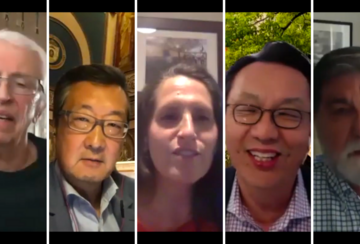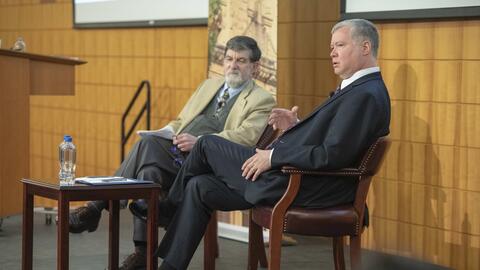Stay Connected

In his new book, "Patterns of Impunity," Ambassador King, the U.S. special envoy for North Korean human rights from 2009 to 2017, shines a spotlight on the North Korean human rights crisis and argues that improving human rights in the country is an integral part of U.S. policy on the Korean peninsula.
![[Top left] Gi-Wook Shin; [top right] Roberta Cohen; [bottom left] Tomás Ojea Quintana; [bottom right] Joon Oh](https://fsi9-prod.s3.us-west-1.amazonaws.com/s3fs-public/styles/360x244/public/hero/korea_un_north_korea_human_rights_hero.png?h=c4d9845d&itok=lsb1zZAp)
Experts on human rights agree that the UN needs to work through multiple channels to support ongoing investigations and build evidence for future litigations in order to create accountability and pressure the DPRK to desist in committing human rights crimes.

“The South Korean people gave the Moon administration a red card,” says APARC Director Gi-Wook Shin, predicting that containing soaring housing prices and other domestic challenges will be the deciding issues in next year’s presidential election.
The competition is open to both undergraduate and graduate students. The award carries a $1,000 cash prize.

Contributing authors to the new volume 'Demographics and Innovation in the Asia-Pacific' convened for a virtual book launch and discussion of the challenges facing aging societies in East Asia and the roles technology and innovation may play in rebalancing them.

Yong Suk Lee explains in the new volume, Shifting Gears in Innovation Policy, that while ‘catch-up’ strategies have been effective in promoting traditional economic growth in Asia, innovative policy tools that foster entrepreneurship will be needed to maintain competitiveness in the future.

The Center has launched a suite of offerings including a predoctoral fellowship, a diversity grant, and research assistant internships to support Stanford students interested in the area of contemporary Asia.

Ahead of President-elect Biden’s inauguration and on the heels of the attack on the U.S. Capitol by a pro-Trump mob that has left America shaken, an APARC-wide expert panel provides a region-by-region analysis of what’s next for U.S. policy towards Asia and recommendations for the new administration.

A study by Yong Suk Lee, the deputy director of APARC’s Korea Program, and Management Science and Engineering professor Charles Eesley investigates the efficacy of two major Stanford entrepreneurship education initiatives, suggesting they may not increase entrepreneurial activity.
![[Left] The Impossible State by CSIS; [Right] Director Gi-Wook Shin](https://fsi9-prod.s3.us-west-1.amazonaws.com/s3fs-public/styles/360x244/public/hero/impossible_state_gws.png?h=c4d9845d&itok=mV0oWey_)
Democratic Erosion in South Korea
Democratic Erosion in South Korea
Gi-Wook Shin discusses the state of democracy in South Korea, and how democratic backsliding there fits into larger patterns of democratic decline underway across the globe.

The Center’s commitment to supporting young Asia scholars remains strong during the COVID-19 crisis.

‘Brain Bridges,’ a documentary produced by senior Dexter Sterling Simpson, illustrates the positive gains of global talent flows.

In an interview with Stanford News, Gi-Wook Shin, the director of APARC and the Korea Program, describes how divergent perspectives on the legacies of WWII continue to shape different understandings of history and impact inter-Asia and U.S.-Asia relations.

To support Stanford students working in the area of contemporary Asia, the Shorenstein Asia-Pacific Center is offering research assistant positions for the fall, winter, and spring quarters of the 2020-21 academic year.

On the Business Insider's podcast "Brought to You By. . .", APARC and the Korea Program Director Gi-Wook Shin discusses how Samsung Electronics became so entwined with the history and identity of modern South Korea, and what the internal politics of the company indicate about broader Korean society.

South Korea is following global trends as it slides toward a “democratic depression,” warns APARC’s Gi-Wook Shin. But the dismantling of South Korean democracy by chauvinistic populism and political polarization is the work of a leftist government, Shin argues in a ‘Journal of Democracy’ article.

Led by APARC, a panel of scholars hosted by the Freeman Spogli Institute weighs in on the implications of recent events on the Korean peninsula and the ongoing uncertainties in charting a future course with the DPRK.

Won-Gi Jung (BA '20) is awarded the ninth annual Writing Prize in Korean Studies for his paper, "The Making of Chinatown: Chinese migrants and the production of criminal space in 1920s Colonial Seoul."

To encourage Stanford students from underrepresented minorities to engage in study and research of topics related to contemporary Asia, the Shorenstein Asia-Pacific Research Center is offering a new Diversity Grant opportunity. Application reviews begin on September 1, 2020.

Amid escalating inter-Korean tension and increasing economic and social strain on North Koreans in the era of COVID-19, the importance of keeping international attention on the DRPK’s human rights violations is more urgent than ever.
The competition is open to both undergraduate and graduate students. The award carries a $1,000 cash prize.

Scholars from each of APARC's programs offer insights on policy responses to COVID-19 throughout Asia.

The Korea Society hosts APARC's director for a timely discussion of the recent South Korean national election.




